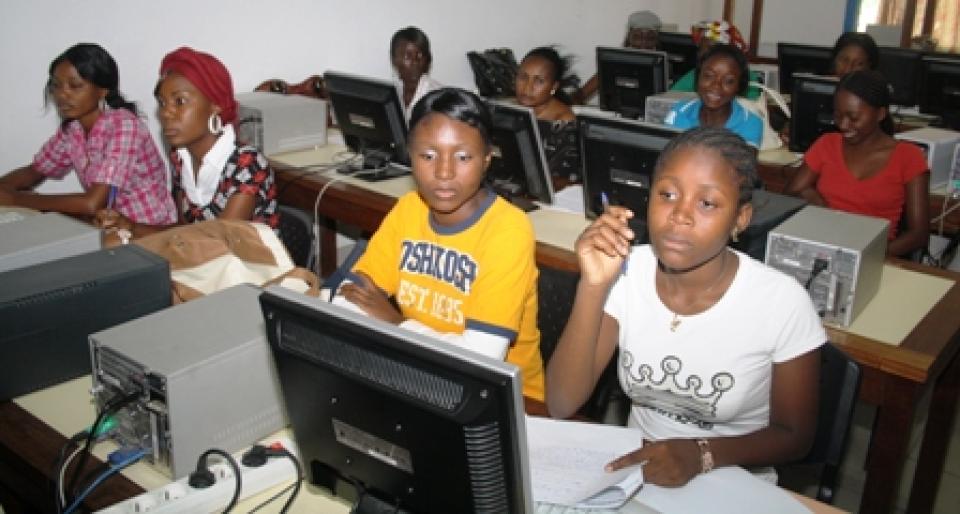
Bakekolo’s account is just one of other encouraging narratives of how female high school students, women and girls in Congo, having been trained in the use of different technologies were able to signal cases of abuse, build awareness around their experiences and help support others to fight the violence they encounter.1 The women and girls in this and other projects really did ‘take back the tech!’, as the Association for Progressive Communications Women’s Networking Support Programme (APC WNSP) hoped when providing small grants to community based organisations.
The work of the APC WNSP with organisations in Congo provides invaluable real life experiences that can be useful in discussions at international forums like the upcoming fifty-fifth session of the Commission on the Status of Women (CSW) whose theme this year is women, technology and education. The meeting will take place at the United Nations headquarters in New York from the 22nd February to the 4th March 2011.
APC small grants projects
Through the MDG3 Take Back the Tech! Fund, the APC WNSP provided small grants of up to USD5000 each to over sixty local, primarily community based organisations to implement projects that use ICTs to end violence against women and girls, at the same time building their capacity to do so. Grant recipients were from twelve countries in Africa, Asia and Latin America. From Africa, organisations in the following countries received grants: South Africa, Democratic Republic of Congo (DRC), Republic of Congo and Uganda, while recipients from Asia were selected from Cambodia, Malaysia, Pakistan and the Philippines. From Latin America, organisations in Argentina, Brazil, Colombia and Mexico benefited from the grant.
In Congo, five different organisations received the small grants. These organisations include; the Association Dynamique Plurielle in Brazzaville, the Association Femmes Solidaires in Brazzaville, the Jeunes Infrastructure et Développement (CJID), the Comptoir Juridique Junior and the Handicapés Sans Frontières in Pointe-Noire.
Sharing Experiences: Small grant projects in Congo
Project 1: Prevention of sexual harassment in schools using mobile phones
In an innovative project titled, ‘Prevention of sexual harassment in schools using mobile phones’ the Association Dynamique Plurielle worked with 250 students, 30 teachers and administrative staff at one of the largest high schools in Brazzaville, Savorgnon de Brazza High School.
Speaking on some of the successes of the project, Myrna Muryelle Bakekolo, the Project Coordinator notes that through the grants they received, they have been able to hold several sessions with students and teachers to raise their awareness on what constitutes sexual harassment in the context of the school. Other sessions were on familiarising students on the Portella and Potignon Acts, which prohibit relationships between teachers and students and protect minors. Bakekolo also adds that they sent (three times a month) SMS messages to students on the relevant laws. To encourage participation of the students, Bakekolo states that there were SMS competitions for students on the content of the laws and the winners of these competitions received free internet browsing tickets and airtime.
“Since the project began, three months ago, we received several testimonies by SMS: sexual harassment in schools and cases of incest in families. The testimonies were made by students between 16 and 21 years,” highlights Bakekolo. “We also recorded examples of violence perpetrated by the use of mobile phones, for example some girls complain about receiving unwanted SMS’s from their colleagues.”
Although the project has been largely successful, Bakekolo however mentions some of the challenges they face in implementing the project. One challenge is that there are some boys at the school who are interested in the project but are not able to participate because the project specifically targets girls. Speaking on the available laws, Bakekolo mourns that there is no law on sexual harassment.
Project 2: Prevention of sexual harassment in schools using mobile phones
In a similar project, the Comptoir Juridique Junior is working with 200 students from Pierre Tchicaya Bomampire Secondary school and the OCH Technical and Commercial High School in Pointe-Noire. Since the project started several meetings have been held with students and teachers in the two schools to conscientise them on what constitutes violence against women and girls. There have also been sessions educating participants on human rights, violence and psychological care. In addition, about 200 SMS messages are sent out every month. As with the first project, competitions are held on the information shared and winners receive internet browsing tickets.
Speaking on some of the positive outcomes of the project, Severa Mpassi, the Project Coordinator says; “Following awareness on violence against women and girls in the schools, we recorded the testimonies of students and teachers. We listened to them and provided counselling.” Looking to the future, Mpassi highlights that there is need for a training of trainers in the area of violence and ICTs.
Project 3: Training of women and young mothers living with HIV/AIDS and survivors of violence in counselling and the use of internet and radio
In this project, the Association Femmes Solidaires, an organisation based in Brazzaville trains women and girls infected and affected by HIV/AIDS and also survivors of violence in counselling and the use of the internet. Through this project, the women are able to provide psychological support to their peers. Most of the women are not highly educated. Some are unemployed, while others are market vendors. The most common form of violence the women mention is domestic violence perpetrated by spouses and parents once they hear of their HIV status. The executive director of the Association Femmes Solidaires, Emma Ursula Tsoulou adds that some of the women encounter violence at hospitals where they report having been abused, discriminated against and stigmatised.
Since the project started, thirty women have been trained and by the end of the project, the Association Femmes Solidaires hopes to have trained fifty women. In relation to the training on counselling, Tsoulou says, “Twenty women and young mothers have been trained who are able to listen, provide advice and guidance to women and girls infected and affected by HIV who are victims of violence who come to our centre to look for support. Since the training, the counsellors volunteer three days a week at the centre.” Tsoulou continues to state that ten women have been trained in basic computer and internet skills. These women will at a later stage learn blogging. “We also began a series of radio programmes on violence with women and girls involved in the project to talk about their experiences, their rights and violence against them for awareness and advocacy purposes,” adds Tsoulou.
Speaking on some difficulties the women encounter, Tsoulou explains that the limited number of computers at the centre forces the women to rely on internet cafes whose costs they cannot afford.
Project 4: Fight against violence against women in media and women with disabilities through the use of photo and the internet
In this project, Handicapés Sans Frontières, an organisation based in Pointe-Noire, Congo works with sixty women and journalists with disabilities to educate, denounce, and find solutions to end violence against them as well as help them break the silence. To date, two awareness workshops have been held with sixty women on women’s rights and how to fight violence against women in the media and women’s circles for those with disabilities. Twenty women have been trained on basic internet skills and blogging.
Coming from the training, the president of Handicapés Sans Frontières, Georgette Medja notes that the twenty women with disabilities and journalist trainees have created email addresses (for those who did not have) and blogs to document violence against women and girls with disabilities in Pointe-Noire. Medja adds that the women journalists also share information through SMS and email as well as produce radio and television programmes that bring to light the violence that women and girls with disabilities face.
As a result of this work, Medja observes thus, “We have already received at least eight cases of abuse of women and men with disabilities that we refer for proper legal assistance to our partner organisation, Comptoir Juridique Junior, another APC WNSP’s grantee. We also refer cases to hospitals in Pointe-Noire. The eight cases involved complaints of forced prostitution, rape, fondling, and rejection by relatives.”
Medja notes that some challenges faced by women with disabilities regarding internet access is that most internet cafes cannot be easily accessed. Another challenge Medja talks about is that the slow internet connection and power cuts slow down progress. For the future, Medja concludes thus; “We intend to mobilize additional resources to raise awareness among media outlets on violence against women and the need to give a voice to women and girls with disabilities.”
Recommendations to the CSW
In the context of what the grantees in Congo said above, several key challenges were raised that can be taken up at the forthcoming 55th session of the CSW. These challenges range from lack of adequate computers to lack of funding and trainers. These problems slow down and sometimes completely stop efforts to use ICTs to fight violence against women and girls. Since access to knowledge and freedom of expression are key frameworks to measure the advancement, or lack of it, of women and girls’ participation in this field, it is essential for the following points highlighted by the grantees in Congo to be considered in policy discussions at the CSW:
- There is a need for a free helpline dealing with calls related to violence against women and girls.
- There is a need for funding and trainers who can make the link between ICTs and fighting violence against women and girls.
- There is a need for more computers and internet connectivity.
- There is a need to consider ways of making internet cafes to be accessible to women and girls with disabilities.
- There is also a need to find alternatives to electricity since internet use is affected by intermittent power cuts.
Responses to this post
I wish initiatives on the use of ICTS to fight violence against women could
go beyond the use of cell phones to deploy high techs like GPS to locate
where pervets using young girls as sex slaves. Pl kindly let me know if you
have any ideas about this.
- Add new comment
- 14247 views






Add new comment